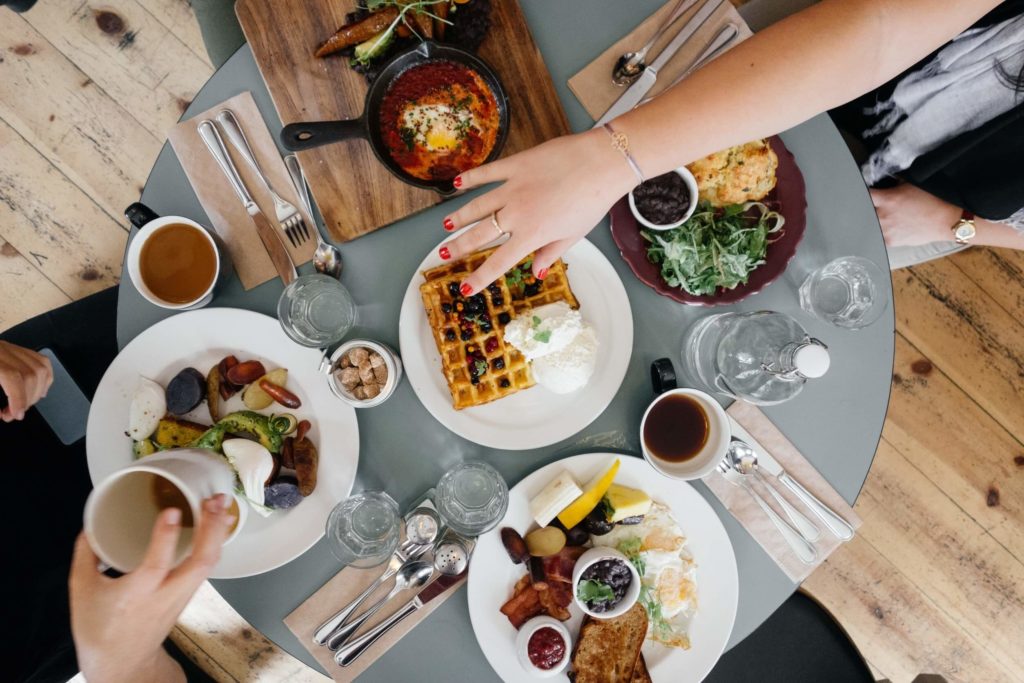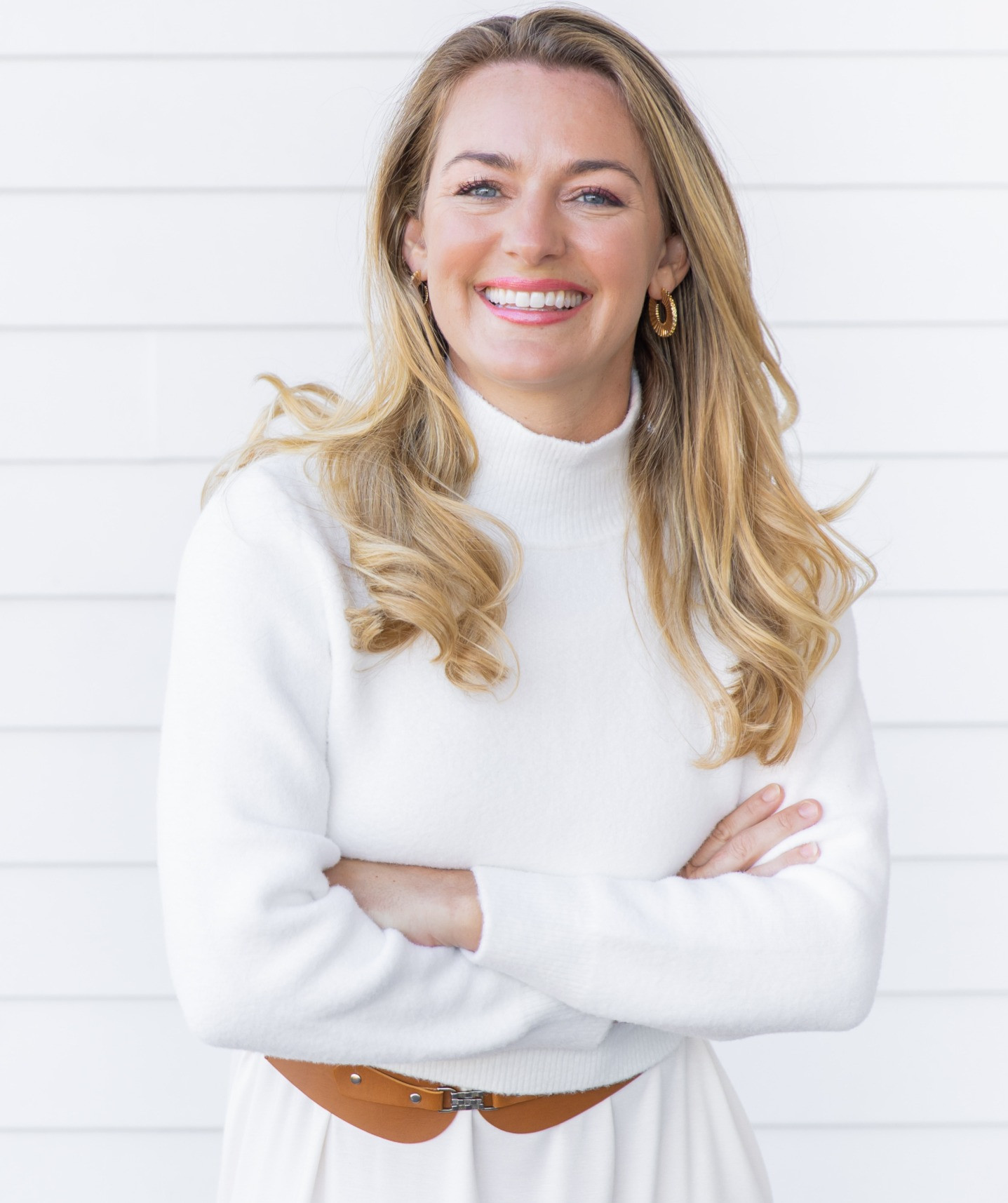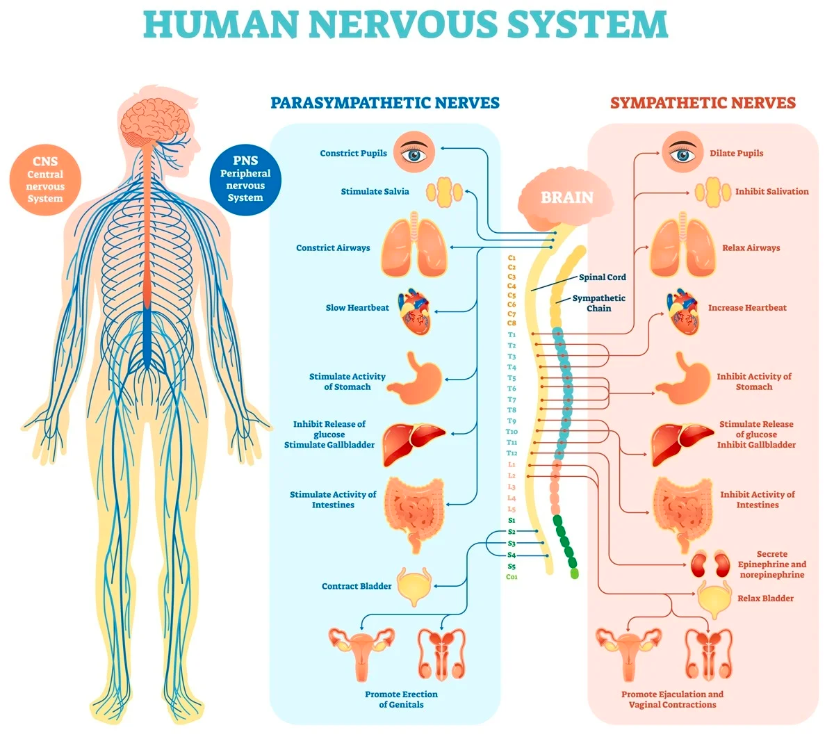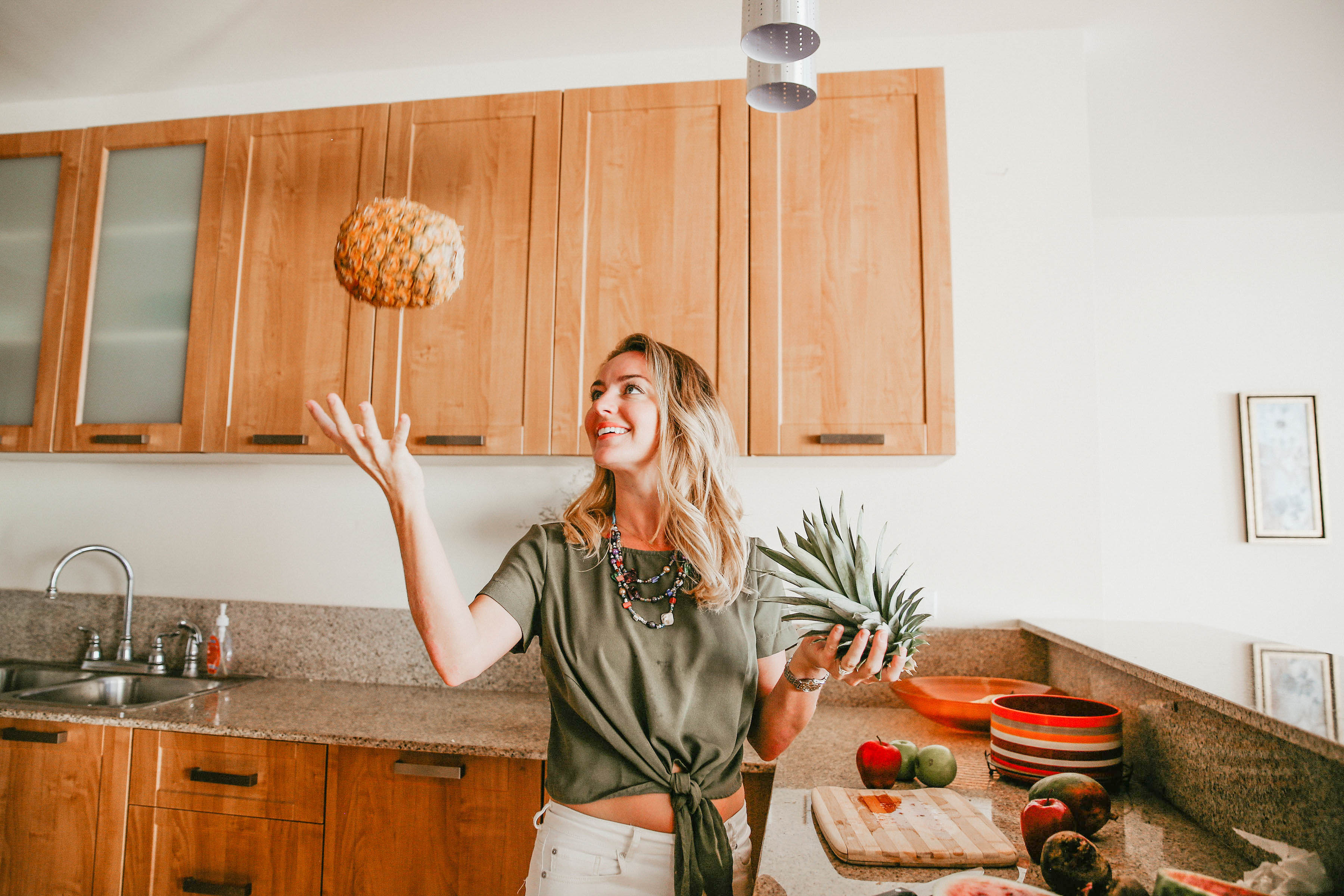Start healing your relationship with food.
December 18, 2022

Food. Love it or hate it, you’re in a relationship with food. Food fears, food anxiety, and body dysmorphia are at an all-time high around this time of year. Many of us go on vacations to the beach feeling nervous about our “beach body.” In other cases, we’re seeing family we haven’t seen all year and we want to present how well we’ve been doing; unconsciously equating thinness to having a more successful year. In a less positive scenario, you might have family members who grew up in an age rife with diet culture and you are feeling anxiety around seeing them and being the target of their inevitable comments. Maybe you promised yourself this was the year you got your “body back” or “dream body” only to get to December and have your warrior body be indicative of just that – you living 2022 in survival mode.
Even as a health professional, I still struggle around this time of year. I want you to know you are not alone. Whether you’re experiencing mild anxiety or full-on disordered eating this post is a “how to” on healing your relationship with food, and as a positive side effect – your body and self too.
Disclaimer
This post is not intended to replace professional help and care. If you suspect you or someone you love is suffering from an eating disorder please seek professional medical and/or psychological help. If you are on this healing journey and want to prioritize your health. Reach out to our team of Registered Dietitians and gut health coaches at Gut Health Agency.
Wait, my relationship with food is fine…
Right?
Many people do not even realize that the thoughts and behaviors around food and their bodies are not healthy ones. I didn’t realize how complex and entrenched my (then) unhealthy relationship with food was until a mentor called me out on some of these recurring thoughts. Are some of these thoughts and behaviors ones you regularly find yourself thinking and acting out? Do you:
- Label foods as “bad” and/or avoid food groups altogether.
- Skip meals after you had “bad” foods earlier on that day or the day before?
- Avoid eating with others.
- Avoid social events where foods on your bad list will be in abundance.
- Prefer eating alone because you don’t want others to judge your portion sizes or choices.
- Consistently choose the healthiest option on the menu, even over the ones you’d prefer when eating out with others.
- Use food as a reward system and/or as punishment.
- You eat until you are uncomfortably full or even continue eating after you’re full.
- You feel guilt or shame before or after eating.
- You feel shame around eating certain foods or about eating larger portions.
- You eat in response to certain emotions like anxiety, disappointment, nervousness, anger, or sadness.
- Your food choices determine how you feel about yourself and/or your day.
- Restrict yourself before holidays/ big events.
- Constantly try new diets, shakes, or weight loss supplements even if you are at/below a healthy weight.
- Weigh yourself and allow the number on the scale or your current clothing size dictate how you feel about yourself and your food choices.
- Not remember a time when you were not “dieting” or trying to lose weight.
- You feel the need to work off the food you eat.
- You are inflexible to new foods or even others dishing up food for you.
- Deny yourself the food you enjoy because it deviates from what you believe you should eat.
- You always clear your plate even if you’ve had enough halfway through your meal.
You identified yourself in at least 7 of these
But you’re still scared to change.
I tested these out on people I know who have very healthy relationships with food and themselves and even they said yes to a few of these. Identifying with some of these conditioned responses does not mean you have a bad relationship with food. But if you identified with 7 or more of these, it is worth examining your relationship with food and if you’d like it to improve.
It honestly scared me to write this list because ALL of these were behaviors and/or thoughts I used to have. I thought these were the thoughts of a health-conscious and normal woman. I’m here to tell you having all of these are not what a healthy relationship with food looks like. It can be empowering to know you’re not alone AND that you don’t have to live this way.
These behaviors and thoughts are taking so much of the precious brain power that you could be using to be more present with your loved ones or chasing that purpose. The scariest part for me wasn’t that I had said yes to ALL 20 of the points above. It was more that I said yes and still didn’t want to change. If I didn’t have these thoughts and behaviors in place I would completely lose control. I’d spend every day binge-eating chocolate brownies and pizza, right? These thoughts and behaviors keep me safe, right?
Wrong.
Why heal your relationship with food
And what a healthy relationship with food looks like?
A healthy relationship with food:
A healthy relationship with food is one where you no longer use food as a reward or punishment. Food is fuel – both for your body and soul. You can listen to your body’s hunger and fullness cues as well as what you are craving. A slave to cravings no more! There’s no need to binge because there are no “bad” foods that you are restricting. You are not constantly thinking about food because you consume enough variety and calories. You stop eating when you are full and you feel no guilt in enjoying the foods you once deemed as “off limits” is now your norm.
You have jumped out of the restrict-and-binge cycle, so you feel confident in enjoying foods in whatever portion feels good to you in public, choosing the food you really want over the healthiest option. And you can now enjoy that healthier option when it is what you want without wishing you had ordered something else. There is no exercising as punishment or eating certain foods. You have come to realize diets don’t work and never have. Trust becomes an integral part of your relationship with food and yourself because you know your body will let you know what foods it needs and how much of that food to eat. You realize there will be days you eat too little and too much but you no longer punish yourself or feel shame and guilt around those days and/or your ever-changing body.
Sheesh, isn’t that the dream? We are striving towards this ideal with all our clients and members. Your relationship to food is an INTEGRAL part of gut health (hence the term: gut, brain connection). How you feel while eating and/or about your food directly affects how your body responds to food. I’ll expand on this connection in a bit. First, let’s dive into why we’re so passionate about healing your relationship with food.
Why heal your relationship with food?
The paragraph above showed you ALL the reasons it would be incredible to heal your relationship with food. But an important aspect I want to shed some more light on is the impact your relationship with your food has on your health.
The fact that you feel nauseous before a big presentation, butterflies at that cute moment, or a stomach ache when under a lot of stress all indicate that your gut and brain are closely connected. This is precisely why we incorporate subconscious therapy at The Gut Health Agency. We understand that the gut controls everything from absorbing nutrients to what you crave. And our guts are directly linked to our emotional state.
This means how you perceive the food can impact factors like how much you eat, how soon you get full, how much you enjoy the food, and even how much (nutrients and calories) is absorbed. This was both a terrifying and exciting discovery. Terrifying because an alarming rate of women have negative relationships with their food and their bodies resulting in not only the emotional issues involved but also stomach and intestinal problems like IBS, bloating, cramping, and loose stool.
Healing your relationship with food won’t only impact your relationships, willingness to engage in social activities, and how you feel about yourself and food; it is also a key component of gut health. This is the very pinnacle of holistic health. Now with more stressors than ever, is the time to heal your relationship with food to relieve you of one more of these daily stressors.
Why HOW you eat can be more important than WHAT you eat.
This link between the gut and the brain is also fascinating. Let this knowledge empower you to know that with small and consistent steps you could heal more than your relationship with food, you could also directly impact your health by how well your body uses that fuel. We are living in an era riddled with chronic stress. This leaves us in a constant state of “fight or flight.” When in that state, your body cannot prioritize things like digestion and absorption because it’s flooded with adrenaline and cortisol while focusing on survival. Here are some guidelines on how to eat to start the journey of healing your relationship with food and, in the process, helping out your gut as well.
How to start healing our relationship with food:
Practise Mindful Eating
Mindful eating can come in many forms. It can be taking some deep breaths before your meal. Eating undistracted or slowing down your eating. Chewing your food a minimum of 30 times per bite. There are beautiful meditations you can do while you eat. I enjoy this one on days that pesky food anxiety pops up.
Stop Labelling Food
This takes practice, but the first step is awareness. Begin by observing your thoughts and unconscious judgments over specific foods. Notice them and then reframe them with a mantra like “food is fuel, and I am allowed to enjoy all variations of it.” Next, watch your language around food. When you find yourself saying things like “I can’t eat that…”. Pause and ask yourself, “can’t I or have I just not ever allowed myself to enjoy this food?” Then be curious to see if you even actually even enjoy this food or not and why you had this food rule before. Remind yourself that all foods can be part of a healthy and balanced diet.
Start introducing the foods previously labeled as “off limits.”
I know it’s scary. But if we are going to heal our relationship with food, we have to go past not labeling certain foods as bad. We also must prove to ourselves that our fear is not based on truth.
Start small by incorporating this food into another snack or meal. For example, you can enjoy that cookie with your bowl of fruit.
Notice those urges to binge on those foods that you previously restricted. Acknowledge that this is only because you told yourself it wasn’t allowed. Remind yourself that things have changed and that you don’t need to eat all these cookies now because you are allowed to have them anytime you feel like them and will never restrict yourself again. That knowledge can be soothing to a desperate brain because the sense of urgency of “get it while I can” is no longer valid. Instead, switch to an “I’ve had one already, I can have another one or all of them either way, there is always tomorrow.”
While this seems scary and might lead you to eat a little more than you’d like at first, it’s necessary to heal your relationship with all food and eradicate that food fear and anxiety that previously plagued you.
Try intuitive eating
(one meal or day at a time)
Intuitive eating scares anyone with a rocky past with food and their view of themselves. This is because we have learned and been conditioned not to trust ourselves. Through unhelpful methods like calorie counting and macro tracking, we have reduced foods to something that either gets us to our goals or weakens us. But your goal now is food freedom. A common fear is that if you left it up to your body, you’d eat junk food all day. Luckily this is a myth, and the more you practice listening and trusting your body, the more you start to realize your body is highly intelligent in the macro and micronutrients it needs.
Start slowly by asking yourself at just one meal – what is my body really craving? Close your eyes and take a breath to connect with your body. Whatever it is – allow yourself that food and enjoy it.
Once this feels less scary, start doing it at more meals and, eventually, for a whole Sunday. Eat exactly what you’ve been craving all day. After consistently practicing this, I started noticing I was craving green veggies, a salad, and even beans! On other days I really wanted something chocolatey and delicious, but I realized that my body just wanted to nourish itself and function optimally. And when I got out of my body’s way – it craved precisely what it needed to do just that.
Leave some food on the plate
There is an idea known as hara hachi bu – the 80% rule. This is the idea of eating until you’re 80% full. For many of us with disordered eating pasts, this can be challenging. You might have lost the ability to correctly judge your hunger and fullness levels. But do not fret this will improve with time and practice. One way to practice this is by simply leaving a little food on your plate at each meal.
This might feel nearly impossible if you are anything like me. But I promise it does get easier.
Go for seconds
Sometimes, you need not to leave some food on the plate but to allow yourself to have that second plate of food. Not restricting yourself is how you remove the urge to binge. Because without scarcity, there’s no need to stuff it all down now.
Bounce back after binges
On the topic of not restricting yourself. It’s essential to build up that self-trust. If you are serious about healing your relationship with food and yourself, you need to commit to not restricting even if/when you inevitably have a day/meal where you eat past the point of being full. Or indulge in foods that used to be on your “bad” or “never” trigger lists.
How you recover becomes paramount to proving to yourself that you are not going to jump back onto that vicious merry-go-round again. It’s like a hug to your body to say, “I’m done punishing you for being, well, a human body!”
This tactic involves returning to your normal eating habits and meals after a binge. No more skipping meals or omitting certain foods to compensate. Research also supports that this is the healthiest option since restricting after a binge almost always leads to another binge. Because let’s be honest – how many times have you said: “just one last time”? It’s an excuse; you don’t need excuses to eat food you feel like eating. This is a reality where there never has to be a “last time” because no foods are off-limits.
Nourish Yourself (Your body and your soul)
Adequate nutrition and calories are the best way to prevent binge eating, excessive cravings, and constant thoughts about highly processed snacks. Your body and brain are hardwired to know where to get those much-needed calories for survival. And when you’re living your life trying to restrict your intake, it’s no wonder you crave those foods. You’re hungry! Craving an instant and easily digestible energy hit is your body looking out for you. When you’re eating an adequate amount and enjoying a balanced lifestyle, those cravings become less frequent and don’t result in a binge.
The reality is that if Medical doctors only receive a semester’s worth of training in nutrition, most everyday individuals are highly undereducated on how to nourish themselves. The beauty of coaching is that you fast-track your learning because we’ve done all the learning (and made all the mistakes) for you. Teaming up with someone to ensure you properly nourish your body is one of the best investments you can make.
By now, it’s also clear how complex your relationship to food is; another aspect we dive into with our clients is healing the emotional ties we have to ourselves and food because we understand what an essential piece of the puzzle this is.
It’s the most wonderful time of the year.
I hope you found these tips helpful to start that journey to healing your relationship with food. Because this time of year should be about being present with your family and loved ones. Don’t let your unhealed relationship with food steal those precious moments any longer. You can do this!
Have a blessed festive season loves
Chelsea
xxx
Leave a Reply Cancel reply
Featured
Read
Podcast
Have you tuned in?
Chelsea interviews professionals to bring YOU today’s most updated knowledge on nutrition and wellness.




